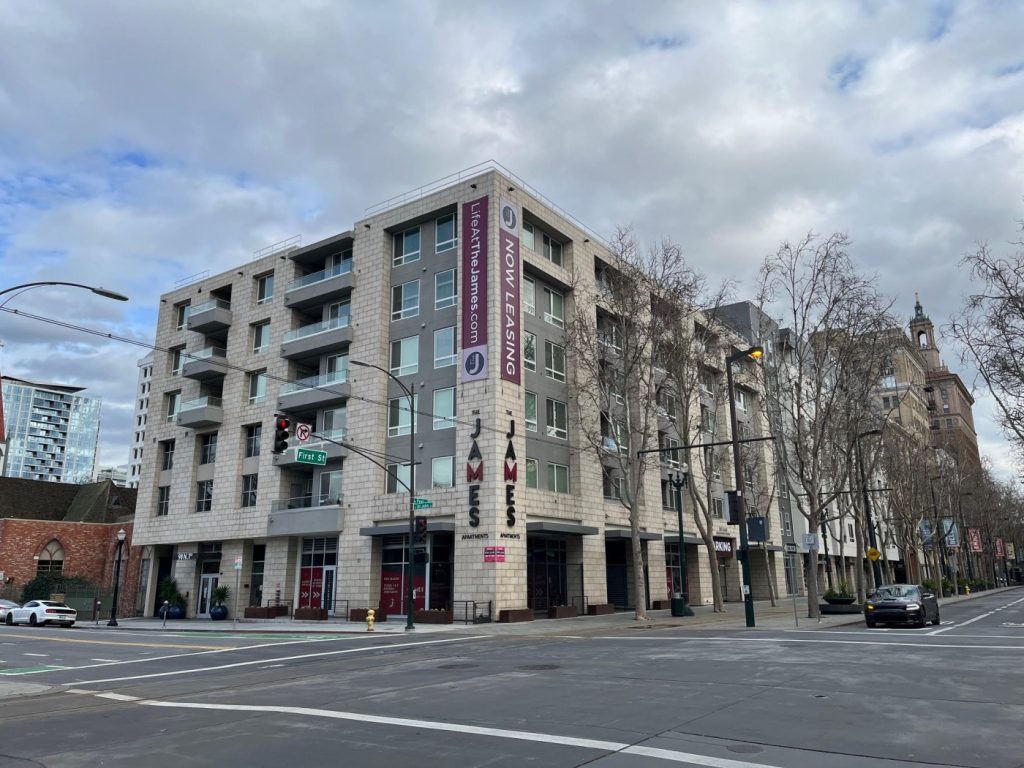SAN JOSE — An apartment complex in downtown San Jose aims to convert its retail spaces into residential units, fresh evidence of the turmoil that has jolted the Bay Area’s wobbly commercial property market.
The James, a relatively new apartment building, is slated to become one of the latest efforts to convert empty commercial spaces into residences in a quest to meet a steady hunger for housing in the Bay Area.
Empty ground-floor commercial spaces in The James, a 190-unit, six-story apartment complex at 98 North First Street in downtown San Jose. (George Avalos/Bay Area News Group)
The proposal envisions the creation of residential units that would be converted from commercial spaces on the ground floor of The James, documents on file with San Jose city planners.
The apartment complex is located at 98 North First Street at the corner of East St. John Street. It was built in 2019. Along with the residences, the apartment complex features ground-floor spaces for retail or office uses.
Pool area of The James, a 190-unit, six-story apartment complex at 98 North First Street in downtown San Jose. (Berkadia)
In September 2023, an alliance of Archway Equities and Virtú Investments, both real estate firms with decades in the business, paid slightly less than $74.3 million for The James apartments.
The James owners now want to convert the street-level spaces into nine or 10 residential units, a filing with San Jose planners shows.
The ground-floor spaces are empty, an on-site observation by this news organization in recent days reveals. These existing street-level spaces total a combined 10,800 square feet, according to the filing with the city.
The markets for both offices and certain types of retail spaces have begun to wither in the face of weakening tenant and corporate demand.
Tech companies in particular have slashed Bay Area jobs at a brutal rate, a downsizing that has prodded high-tech firms to drastically reduce their appetite for office spaces in this region.
In the spring of 2020, state and local government agencies instituted wide-ranging business shutdowns to combat the spread of the coronavirus. The closures, however, also chased away potential office, retail and restaurant tenants.
These fast-shifting dynamics have forced owners of commercial real estate to scout for ways to make their buildings more valuable as well as keep the financing afloat.
In downtown San Jose and downtown Oakland, and elsewhere in the Bay Area, feeble demand for office and retail space, worsened by a wobbly hotel sector locally, has prodded more building owners to consider converting their commercial properties to housing.
Housing conversions are occurring even in a relatively robust office, retail, restaurant and hotel hub such as San Ramon’s Bishop Ranch.
Related Articles
Contra Costa County pauses all-electric building requirements, natural gas ban for new construction
Lawsuit may force downtown San Jose church site foreclosure
A Silicon Valley billionaire-backed campaign for a new Bay Area city is off to a bumpy start. Again
Big Santa Clara apartment complex is bought in deal that tops $100 million
San Jose housing towers could sprout near mega malls
Sunset Development, the principal owner and developer of Bishop Ranch, is pursuing the creation of a neighborhood of homes and shops on the site of the Chevron office campus. Chevron is leasing an office site in Bishop Ranch for its new world headquarters.
In some cases, owners are considering wholesale conversions of office towers and hotel high-rises. Others are eyeing housing in what had originally been intended as ground-floor retail space.
These endeavors come as the region faces a persistent housing crisis while downtowns struggle to rebound in the wake of the coronavirus pandemic, which has resulted in a forbidding landscape for commercial real estate.
Additional housing units in downtown San Jose could help bolster economic activity in the city’s urban core.
Plus, without conversion efforts, the ground-floor spaces could sit vacant for a considerable time.
Regarding the conversion plans for The James in downtown San Jose, one scenario on file for the proposal envisions the creation of eight studios and a single one-bedroom apartment. A different studios-only version shows spaces for 10 residential units.


